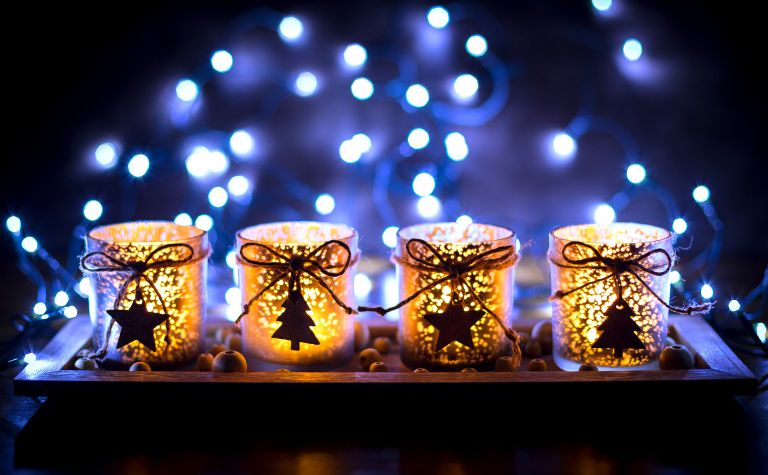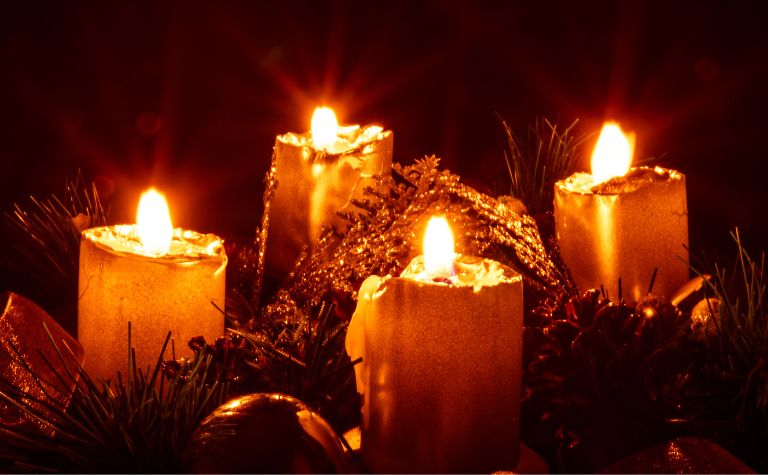Christmas is a time of joy, celebration, and traditions that unite families and communities.
One such beloved tradition is the Advent calendar, a special calendar used to count down the days leading up to Christmas.
But when exactly should you start opening the doors or windows of your Advent calendar? It’s a question that often arises as the Christmas season approaches.
In this article, we’ll explore the traditional start date for Advent calendars, look at the variations that exist, and offer guidance on choosing the best start date for you and your family.

Advent’s Traditional Start Date
When it comes to starting your Advent calendar, there’s a traditional date that many people adhere to: December 1st.
But why is this date so commonly chosen, and how does it align with the Advent season? Let’s explore.
Why December 1st?
The tradition of starting the Advent calendar on December 1st is largely a cultural practice that has gained widespread acceptance.
It offers a straightforward way to count down the 24 days leading up to Christmas, culminating in the celebration on December 25th.
This practice makes it easy to remember and is especially convenient for pre-made calendars, which often come with exactly 24 windows or doors to open.
Alignment with the Advent Season
While the traditional start date of December 1st is widely recognized, it’s worth noting that this date doesn’t always align perfectly with the liturgical Advent season.
As mentioned earlier, the Advent season in the Christian calendar starts on the Sunday closest to November 30th and lasts for four Sundays.
Therefore, depending on the year, the Advent season could start a few days before December 1st or even after.
Flexibility and Personal Preference
Although December 1st is the traditional start date, the Advent calendar is a flexible tradition.
Some people choose to align their calendar with the liturgical Advent season, starting on the first Sunday of Advent.
Others may have their own family traditions or personal preferences for when to start the calendar.
In summary, while December 1st serves as the traditional start date for most Advent calendars, it’s not a hard-and-fast rule.
The key is to choose a start date that aligns with your traditions and how you wish to observe the Advent season.
Whether you opt for the traditional December 1st start or choose a date that aligns more closely with the liturgical Advent season, the most important thing is to make the practice meaningful for you and your loved ones.

Variations in Start Dates for Advent
While December 1st is the traditional start date for Advent calendars, it’s not the only option.
Variations in start dates cater to different traditional, cultural, or personal preferences.
Understanding these variations can help you choose a start date that best suits your own traditions and beliefs.
Traditional Variations
In some Christian denominations, the Advent season starts on the Sunday closest to November 30th, which can be a few days before or after December 1st.
People who follow the liturgical calendar closely may choose to start their Advent calendar on this day to align with the traditional observance of Advent.
Cultural Variations
The start date for Advent calendars may differ in certain cultures or regions.
For example, in some Eastern Orthodox Churches, the Advent season starts earlier, and adherents may choose to begin their Advent calendars in line with this tradition.
Personal or Family Traditions
Many families have their own unique traditions for when to start the Advent calendar.
Some may choose to start on December 1st but have a special ceremony or ritual that makes the occasion unique to them.
Others might opt for a different date altogether, perhaps to coincide with a family anniversary or other significant event.
Specialized Calendars
Specialized Advent calendars also come with their own set of rules for when to start.
For instance, some calendars are designed to be used during the 12 days of Christmas, starting on Christmas Day and ending on January 5th.
Others might be themed around different holidays or seasons and have their own specific start dates.
Flexibility is Key
The beauty of the Advent calendar tradition is its flexibility.
While December 1st serves as a convenient and widely accepted start date, the most important aspect is the personal meaning and joy that the tradition brings to you and your family.
Whether you stick to the traditional date, align with a traditional calendar, or create your own family tradition, the Advent calendar remains a cherished way to count down to Christmas and celebrate the holiday season.

How to Choose Your Start Date
Choosing the right start date for your Advent calendar can add a personal touch to your Christmas celebrations.
While tradition and cultural norms offer guidelines, the best start date ultimately resonates most with you and your loved ones.
Here are some tips to help you decide when to begin your Advent calendar journey.
Consider Your Traditional or Cultural Background
If you come from a traditional or cultural background that observes Advent in a specific way, you may want to align your calendar with those traditions.
For example, if you’re part of a denomination that starts Advent on the Sunday closest to November 30th, you might choose that as your start date.
Align with Family Activities
Some families have a packed Christmas schedule filled with various activities and events.
In such cases, you might want to choose a start date that aligns well with your family’s Christmas plans.
This can make the daily ritual of opening the Advent calendar a seamless part of your celebrations.
Think About the Calendar Type
The type of Advent calendar you have can also influence your start date.
For instance, if you have a specialized calendar designed for the 12 days of Christmas, your start date would naturally be Christmas Day.
Make It Meaningful
The Advent calendar is all about anticipation and preparation for Christmas.
Choose a start date that adds to the sense of excitement and meaning for you.
Be Consistent
Once you choose a start date, try to be consistent with it year after year. This helps build anticipation and creates a sense of tradition that can be passed down through generations.
It’s Never Too Late
If you miss the traditional start date or any other date you had in mind, remember that it’s never too late to start an Advent calendar.
The key is to make the most of the days leading up to Christmas, regardless of when you begin.
In summary, choosing the right start date for your Advent calendar is a personal decision that can be influenced by a variety of factors, from cultural traditions to family activities and the type of calendar you have.
The most important thing is to choose a date that makes the Advent calendar a meaningful and enjoyable part of your Christmas season.
Making the Most of Your Advent Calendar
Once you’ve chosen your start date, the next step is to make the most of your Advent calendar experience.
This tradition is not just about counting down the days until Christmas; it’s an opportunity to add depth, meaning, and joy to the Christmas season.
Here are some suggestions to elevate your Advent calendar ritual.
Incorporate Daily Rituals
Make the act of opening each day’s window or door a special event.
Whether it’s a morning routine before everyone heads out for the day or an evening ritual that brings the family together, consistency adds to the magic.
Add Readings or Reflections
Consider incorporating short readings, prayers, or reflections that align with the theme of each day or week.
This can add a spiritual or thoughtful dimension to the practice, making it more than just a countdown.
Involve Everyone
Make it a family affair by involving everyone in the daily openings.
You can take turns opening the windows or doors, or assign specific days to different family members.
This makes it more interactive and gives everyone something to look forward to.
Pair with Activities
To make each day’s reveal even more special, consider pairing it with a corresponding activity.
For example, if the theme of the week is ‘Hope,’ you might include a family activity that embodies this concept, like volunteering at a local charity.
Personalize Your Calendar
If you have a DIY Advent calendar, take the opportunity to personalize it.
Fill each compartment with treats, messages, or small gifts that you know will resonate with your family.
This adds a personal touch that pre-made calendars may not offer.
Capture the Moments
Consider documenting the daily reveals through photos or short videos.
This creates a keepsake that you can look back on, and if you’re up for it, you can even share these moments on social media to spread the Christmas cheer.
Related Questions
Joseph, the husband of Mary and the earthly father of Jesus Christ, is depicted in the Gospels as humble, law-abiding, and obedient. In many Christmas scenes, such as in displays of the manger, he is...
The virgin Mary, the mother of Jesus, is one of the most fascinating people in the Bible. For 2,000 years, people of different eras and cultures have marveled at her faith in God. Mary's story in the...
